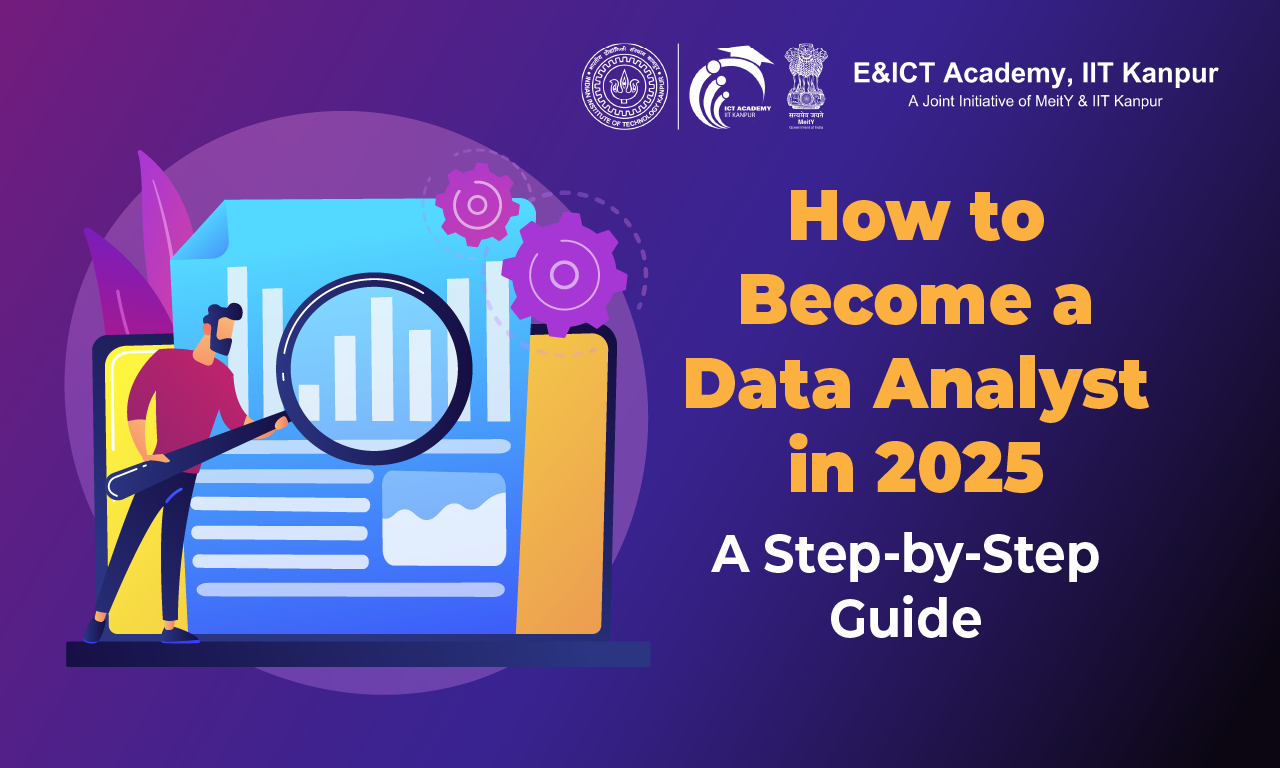Data Analyst Skills & Prerequisites in 2026: A Step-by-Step Guide

Data Analyst Skills & Prerequisites: The world will produce more than 180 zettabytes of data by 2026, which is about double the quantity recorded in 2023. Businesses will increasingly require data analysts to make the best possible decisions based on such big data in the years to come.
Data Analyst Skills & Prerequisites in 2026: As Artificial Intelligence and automation improved, they also changed and reset the industry benchmarks. Traditional approaches of data analysis-based analysis will not work anymore. For analysts to survive in this new climate, they must possess a working knowledge of cloud computing, machine learning, and big data platforms.
Want to step into the changing world of data analytics? This guide will help you with the required skills, learning strategies, and options needed to achieve the desired outcome.
Must Read: 11 Important Excel Formulas for Data Analyst
Step 1: Breaking Down the Data Analyst Role
In 2026 and the years to come, a data analyst’s role will go beyond computations. It will include processing information and drawing actionable conclusions that will drive a business forward. They also work on collecting and organizing bulks of data, cleaning them, analyzing datasets, recognizing patterns, and making visual presentations that assist stakeholders in making informed decisions.
As much as data analysts, data scientists, and business analysts have data in common, they specialize in different sectors. This is how it differs:
- A data analyst makes sense of and works with semi-structured data. They work with SQL, Python, Power BI, and Tableau.
- Data scientists amplify this process by bringing machine learning and predictive modelling into play to identify future trends.
- Business analysts focus on integrating data and strategy by considering the business needs and improvements in the processes.
Step 2: Essential Technical Skills for Data Analysts
A data analyst will need to stay on the competitive side in 2026 and into the future. They will need to become proficient in database administration, programming, visualisation, and AI-enabled analytics to accomplish this. The key points are as follows:
- Programming Languages: Python, R, and SQL continue to be essential. Python is commonly utilized for data handling and machine learning, R is superior in statistical assessments, and SQL is essential for database queries.
- Data Visualization Tools: Effectively conveying insights is essential. Acquiring proficiency in Power BI, Tableau, and Looker enables analysts to build interactive dashboards that influence business decisions.
- Database Management: Analysts utilize both SQL (structured databases) and NoSQL (unstructured databases like MongoDB), in addition to cloud services like AWS and Google BigQuery
- Fundamentals of Machine Learning: AI is changing data analysis by Understanding the fundamentals of machine learning models, which allows analysts to collaborate with data scientists and use predictive analytics effectively.
- Big Data Technologies: Due to the surge in data, tools such as Apache Spark and Hadoop are required for effectively managing extensive datasets.
Must Read: What is Predictive Analytics?
Step 3: Educational Requirements & Certifications
A profession in data analytics necessitates a combination of formal education and specific certifications. Although numerous professionals possess degrees in fields like Computer Science, Statistics, Mathematics, or Data Analytics, specialized certification programs enable individuals to acquire industry-specific skills and remain current with advancing technologies
Step 4: Degrees & Courses
A bachelor’s or master’s degree in a STEM discipline offers a strong basis for data analytics. Nonetheless, due to the increasing need for qualified experts, universities and institutions currently provide specialized certification programs aimed at giving students practical experience.
Must Read: Industry Application of Data Analytics
Step 5: Certifications Worth Considering
For individuals seeking to acquire hands-on skills and acknowledgement in the industry, the subsequent certifications come highly endorsed:
Professional Certificate Program in Data Analytics and Generative AI – E&ICTA Consortium
In today’s evolving job market, AI-driven data analytics is becoming a key skill for professionals looking to stay ahead. This Certificate Program in Data Analytics and Generative AI from E&ICT Academy, IIT Kanpur equips learners with cutting-edge AI tools like ChatGPT and Gemini, along with core data analytics skills. With a strong focus on practical learning, this course prepares you for roles in data science, AI, and business analytics, making you industry-ready.
Certificate Program in Data Analytics and Generative AI: Enroll Today!!
- Duration: 11 months (Virtual Live)
- Technologies Covered: ChatGPT, Gemini, MySQL, Python, Power BI, Tableau
- Training by industry experts
- Hands-on assignments for real-world applications
- Job placement support for career growth
Advanced Certification in Data Analytics by EICTA Consortium
For professionals seeking a flexible learning path while gaining expert guidance, this self-paced certification is an ideal choice. It allows learners to study at their own convenience while getting support from experienced faculty. Covering R, SQL, and Tableau, the course offers extensive hands-on training and real-world projects to build expertise in data analytics.
Additional Worldwide Certifications:
- Google Data Analytics Certificate: Includes SQL, Python, and data visualization tools.
- Microsoft Certified: Data Analyst Associate: Emphasizes Power BI for business analytics.
- AWS Certified Data Analytics: It is perfect for cloud-oriented data solutions and large-scale data platforms.
These certifications offer hands-on skills, industry experience, and career preparation, positioning them as key advantages for future data analysts.
Step 6: Gaining Practical Experience
Gaining practical experience is equally essential as technical skills for succeeding as a data analyst. Hands-on experience improves your problem-solving abilities and reinforces your capacity to handle genuine datasets.
Must Read:Data Analyst Techniques
Internships and Freelance Opportunities
- Internships offer essential industry exposure, enabling budding analysts to engage with actual data and business challenges.
- Working as a freelancer on platforms such as Upwork, Fiverr, and Toptal can provide access to various projects while establishing a professional network.
- A robust portfolio demonstrates your analytical abilities to prospective employers.
- Incorporate case studies, dashboards, and reports generated with tools such as Power BI, Tableau, and SQL.
- Participate in open-source projects to showcase your problem-solving skills.
Must Read: How Business Use Predictive Analytics to Forcast Trends
Step 7: Career Growth & Future Trends
The role of AI, automation, and changing business demands shall redefine the way data analytics is conducted in the future.
- Automation and AI: Nowadays, AI-enabled solutions are toppling the tedious, repetitive tasks out of existence, letting the data analyst ponder deeper into insights and strategic suggestions.
- Self-Service Analytics & Low-Code Platforms: Companies are bidding adieu to even the basics as they embrace swift analytics tools like Power BI, Looker, and Tableau, which enable even non-technical users to create their reports and insights.
- The Necessity of Data Storytelling: Storytelling with data will be mandatory as accessibility to the raw data increases complex datasets into compelling stories that a data analyst should master.
Wrapping Up!
A basic mix of technical skills and quality work experience, as well as lifelong learning, would be required for entry into the data analyst job market by the year 2026. Successfully learning Python, SQL, data visualization tools, and big data technologies, as well as obtaining respective certifications can set you apart in a competitive job market.
If you’re committed to beginning a career in data analytics, think about signing up for the industry-recognized Data Analytics & Generative AI courses at E&ICTA Consortium. Their programs, guided by experts, offer practical training, real-life projects, and job support to improve your career progression.
Discover programs at E&ICTA Consortium today!



